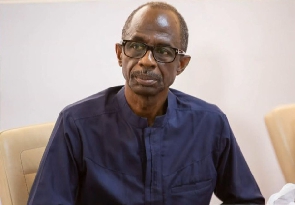- Home - Entertainment
- Lifestyle News
- Entertainment Videos | TV
- Year In Review
- Music News
- Entertainers
- Entertainment Archive
- Entertainment Photos
- Jokes
- Entertainment Headlines
- Ameyaw Debrah
- Brown GH
- Celebrities Buzz
- GH Base
- Ghana Celebrities
- Gh Gossip
- GH Page
- GH Splash
- Hot Gossip GH
- YEN

General News of Thursday, 22 July 1999
Source: --
Ministry against lynching of suspects - Okaija
Accra (Greater Accra), 22nd July 99-
Nii Okaija Adamafio, Minister of the Interior, said on Wednesday that the sector is taking the necessary action to discourage and stop the lynching of suspected criminals by mob action.
This, he said, involves prompt apprehension and prosecution of people caught indulging in the practice.
Additionally, the Ministry educates members of the public belonging to neighbourhood watchdog committees not to lynch, or in any way, brutalise, persons they arrest.
Nii Okaija, who was answering questions during "Question Time' in Parliament, said however, that it is not the responsibility of the Ministry, and for that matter, the police, to educate the public on the provisions of the constitution relating to fundamental human rights and freedoms.
"Such education falls within the purview of the National Commission on Civic Education", he said.The Minister was responding to a question by Mr Joseph Darko-Mensah, NPP-Okaikoi North who wanted to know measures the Ministry is taking to stop the lynching of suspected criminals in blatant disregard and contravention of their fundamental human rights and freedoms.
Mr Darko-Mensah also wanted to find out what steps the Ministry was taking to educate the public on provisions of the constitution on fundamental human rights and freedoms.
Asked whether the Ministry has any working relationship with the National Commission on Civic Education (NCCE), Nii Okaija replied in the affirmative and explained that the Ministry provides adequate security to officials of the Commission whenever they undertake public educational campaigns.
"We do not, however, undertake joint programmes with the NCCE to educate the public on the constitution", he said In an answer to a question whether it is not necessary for the police to educate the public on their limit of action in helping the law enforcement agents to ensure effective policing, Nii Okaija said members of the public who want to offer such assistance must formally inform the police administration.
Asked if in view of the spate of lynching in the country, public education on the constitution, especially on fundamental human rights and freedoms, are adequate, he said "the Commission does not report to the Ministry for us to ascertain whether the education is adequate or otherwise".
On the provision of police stations for districts and towns, Nii Okaija said it is the responsibility of the government to provide such facilities, but inadequate budgetary allocations would not make this possible at one go.
However, communities ready to provide office and residential accommodation for the police are taken out of turn and provided with police stations.
The Minister said in deciding which towns and districts should be provided with a police station, factors such as the population of area, level of crime, economic activities and social facilities are taken into consideration.
In an answer to a specific case in Sabronum in the Ahafo Ano South District, Nii Okaija told the questioner, Mr Stephen Kwaku Balado Manu, NPP-Ahafo Ano South, that there are no immediate plans to open a police station in the town.
He explained, however, that the Ministry has tasked the Brong Ahafo Regional Police Commander to assess conditions whether the area qualifies for such a facility, and submit a report to the Police Administration for the appropriate response.
"The assignment is not yet completed, and to that extent, we have no immediate plans to provide Sabronum with a police station," he said.
On the rehabilitation of the police station at Juaso, which was burnt down during a mob attack, Nii Okaija said as a matter of policy, the Ministry has no immediate plans to undertake such a project and urged the people to rebuild the police station themselves.
"By allowing a section of the people to burn down the police station, the whole community should bear the consequences of the mob action".
Asked what plans the Ministry has to provide a suitable and permanent office and residential accommodation for the Asante Mampong Police, the Minister said the district headquarters, as well as the station, is in permanent buildings.
The Ministry intends to relocate the divisional headquarters from the "present deteriorating premises into a suitable rented accommodation as soon as it is practicable".
However, work on a permanent office and additional residential accommodation for the district and division would be considered in 2002, he added.
The Minister told a questioner that the construction of offices for the Dormaa Ahenkro Police Station and divisional headquarters is scheduled to begin in 2000.










